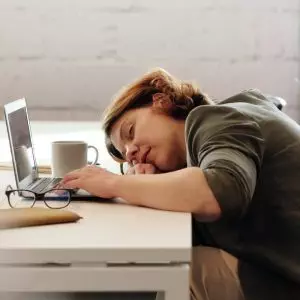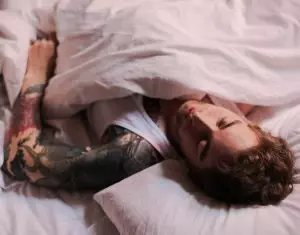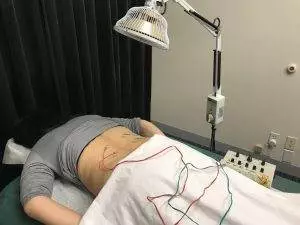By Qineng Tan, L.Ac., Ph.D. and Xiaomei Cai, L.Ac., Ph.D.

Does your partner say you’re snoring loudly or that you stop breathing during sleep? Waking up with headaches or dry mouth? These can be signs of sleep apnea. Sleep apnea and snoring often go together. Acupuncture and TCM offer sleep apnea treatment and CPAP alternatives to help you stop snoring and get more restful sleep.
Sleep apnea, or obstructive sleep apnea (OSA), is a common breathing disorder that occurs when you are sleeping. When you have apnea, your breathing can stop and start repeatedly during the night due to throat muscles relaxing and blocking your airway while you sleep.
Can you have sleep apnea without snoring? Snoring is just one sign of sleep apnea. It is possible to snore and not have sleep apnea, and it is possible to have sleep apnea and not snore.
One type of sleep apnea, called central sleep apnea (CSA), is less common but particularly dangerous, because in these cases the brain is not automatically sending signals to start breathing again when it stops. With CSA, a person may not make any of the loud snoring sounds usually associated with obstructive sleep apnea.
The overall symptoms of obstructive sleep apnea and central sleep apnea are similar. With both types, sleep is interrupted throughout the night, as the lack of oxygen triggers a reflex that wakes you up, perhaps for just a second or two, so that you start breathing again. Most people are not consciously aware of this survival instinct when it happens.
Top 10 Sleep Apnea Symptoms
Many people suffer from sleep apnea without being aware of it, because if you don’t have another person observing what is happening while you’re sleeping, you may not realize that there is something wrong with your nighttime breathing and sleep patterns.
If you have any of these signs of sleep apnea, you may need to seek sleep apnea testing and treatment:
- Suddenly waking up gasping, choking, or feeling shortness of breath
- Episodes of stopped breathing during sleep
- Snoring while sleeping, loud snoring
- Dry mouth, waking up with a sore throat
- Insomnia, trouble staying asleep
- Sleepy during the day, daytime drowsiness, hypersomnia
- Difficulty concentrating, trouble focusing
- Morning headaches, headache upon waking
- Moodiness, mood swings
- High blood pressure
It is important to seek help to resolve sleep apnea, because it has a negative impact on your ability to get restful sleep. You are likely to feel fatigued, foggy-headed, and irritable as you go about your daily routine. Sleep apnea can also compromise your cardiovascular health, increasing the chances of high blood pressure and arrhythmia.
What Causes Sleep Apnea?

Anyone can have sleep apnea, including children. However, there are some risk factors that might lead to you being more likely to experience sleep apnea. These include:
- Smoking – people who smoke are much more like to have sleep apnea
- Age – older people are more likely to have sleep apnea
- Obesity – being overweight can increase the chances of sleep apnea
- Gender – men are much more likely that women to have sleep apnea
- Allergies, asthma, or other chronic nasal congestion issues or lung disease
- Impeded airway – tonsils, adenoids, a narrow throat, or a thicker neck can affect breathing during sleep
- Alcohol or other medications, including opioids, which can have a sedative effect
- Heart problems or diabetes
- PCOS – there is a high incidence of sleep apnea among people with PCOS
- Sleep position – sleeping on your back may increase the chance of snoring
Sleep Apnea Treatment
To determine if a person has sleep apnea and identify the specific type, doctors often conduct a sleep study session. During this session, individuals spend the night at a sleep center where their heart and breathing functions are monitored.
CPAP machines are widely regarded as the most effective treatment for sleep apnea. These anti-snoring devices can help promote more restful sleep, and reduce the risks associated with sleep apnea, such as heart disease.
However, a CPAPmachine does not address the underlying causes of obstructive sleep apnea (OSA) or central sleep apnea (CSA). Some individuals may experience issues like swallowing air, leading to gas and bloating. CPAP masks, which need to be strapped on, can also be uncomfortable. The noise of the machine can be disturbing both the user and their bed partner. It can be challenging for some patients to adapt to using the machine regularly, and without consistent use, they may not reap the full health benefits.
Alternatively, there are oral appliances available, such as mandibular advancement devices (MAD), which are essentially a sleep apnea mouth guard, worn to reposition the jaw and tongue, keeping the airway open during sleep. These appliances can also be effective in improving breathing during sleep. Compared to CPAP machines, they are quiet, discreet, and cost-effective. However, the key consideration is whether an individual can tolerate wearing the device, as some may experience dental pain, TMJ jaw pain, dry mouth, or excessive saliva.
Surgery for snoring and sleep apnea is typically recommended only when other treatment methods have proven ineffective. Various surgical procedures involve the removal of soft tissues, such as the uvula, tonsils, and adenoids.
TCM methods like acupuncture offer CPAP alternatives that may help you sleep better without uncomfortable devices or surgery.
Can Acupuncture Help Sleep Apnea?

According to the principles of Traditional Chinese Medicine (TCM), the spleen and stomach play a crucial role in converting nutrients from food and fluids into vital life energy known as Qi. This Qi is then transported to the heart and lungs.
TCM considers sleep apnea to be linked to issues such as phlegm accumulation and Qi stagnation, which are also associated with fatigue and insomnia. When phlegm gathers and stagnates in the spleen, it hinders the lungs from receiving the necessary Qi. Therefore, one possible explanation for sleep apnea is Spleen Deficiency accompanied by Qi Stagnation. This condition, characterized by dampness and phlegm, often leads to feelings of heaviness and bloating.
In certain cases, excessive internal heat can contribute to the problem. Snoring, excessive sweating, and waking up with a sore throat indicate the need to eliminate heat and toxins from the body.
A systematic review of studies, using acupuncture to treat obstructive sleep apnea concluded that acupuncture was a safe and effective way to reduce the number of breathing disturbances during sleep.
A study of patients in China with sleep apnea who were treated with acupuncture and herbs experienced a marked improvement in deep sleep, oxygen levels, and blood pressure.
Various trials have shown that acupuncture, and in particular electro-acupuncture, can be just as or even more effective that CPAP machines at improving oxygen saturation in the blood.
This can be great news for people who are looking for an alternative to CPAP machines, which can be difficult to adjust correctly and uncomfortable to use, not to mention expensive and potentially disturbing to one’s sleeping partner.
Acupuncture Near Me for Sleep Apnea
If you or your partner is losing precious, quality sleep to sleep apnea and/or snoring, it is important to get help. While conventional treatments work for some people, many people find CPAP machines and other devices for sleep apnea do not help them get the rest they need. Why not give acupuncture treatment for sleep apnea a try? TCM can help you get better sleep without discomfort or unwanted side effects.
*This article is for education from the perspective of Traditional Chinese Medicine only. The education provided by this article is not approved by FDA to diagnose, prevent, treat and cure human diseases. It should not stop you from consulting with your physician for your medical conditions. Traditional Chinese Medicine is based on Qi, which is an invisible force that usually cannot be observed by modern science. Because science focuses on testing ideas about the natural world with evidence obtained through observation, these aspects of acupuncture can’t be studied by science. Therefore acupuncture and Chinese herbs are often not supported by double-blind, randomized trials, and they are considered alternative medicine therapies in the United States.
